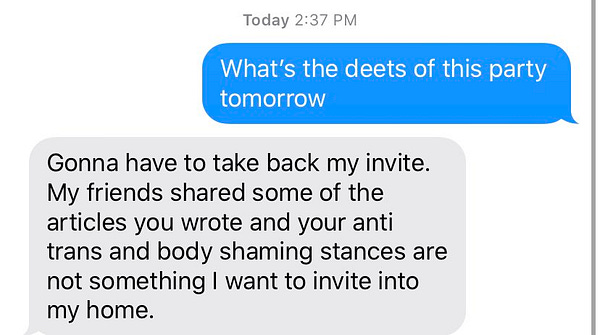Wall Street Journal Chart Shows Why Americans Hate Their Neighbors
It's a lot easier to hate your neighbor when you don’t actually have to live with them.
A new chart out from the Wall Street Journal this week shows why so many Americans seem to hate their neighbors.
On Monday, the nation’s largest newspaper published the results of its latest survey revealing steep declines in what used to be bedrock values in American society.
Here’s what I wrote about the results in The Federalist:
Americans are now far less patriotic, religious, community-oriented, and desiring of children than they were in 1998, while financial priorities have taken over.
Money is now a greater motivator than patriotism and religion. No wonder our corporate elites shamelessly shill for China. When there are no unifying moral standards around shared values, it’s a lot easier to see your neighbor as a competitive enemy than anything else. This is how more and more Americans view those around them.
The same Wall Street Journal poll found that placing value on tolerance for others also dropped from 80 percent four years ago to 58 percent. The results echo earlier surveys documenting nationwide polarization.
According to an Axios poll with Generation Lab conducted in November 2021, “nearly a quarter of college students wouldn’t be friends with someone who voted for the other presidential candidate — with Democrats far more likely to dismiss people than Republicans.”
In the violent summer of 2020, about 2 in 3 Americans reported being afraid to express opinions that were unpopular. When one side wants to utterly destroy the other, it’s not hard to see why. A sports announcer was fired for saying “all lives matter” that same year.
The reality is no matter how blue your neighborhood might be, you almost certainly have neighbors who voted for Trump in the last election. They just might not share it, for good reason.
The coronavirus lockdowns only accelerated the nation’s divisive decline, born out of isolation. The Journal poll’s finding that only about 1 in 4 Americans view “community involvement” as “very important” to them should be among the least surprising from the survey. Childless adults who live online and work from home with a diet dependent on processed food from factories far away aren’t naturally going to be the most engaged in their local communities.
Combine that with Americans being incessantly told their country is irredeemably racist, and it’s even less surprising that just 38 percent of those surveyed by the Wall Street Journal consider patriotism “very important.” According to Gallup, American patriotism fell to an all-time low during the summer of 2020.
2020 was the year Americans retreated to tribalism, celebrating identity politics over collective unity. Just look at the flags people raise on their front lawns and Facebook profiles today compared to 20 years ago. Many Americans have even gone as far as planting social justice yard signs to call their neighbors bad people for not adhering to simple platitudes for complex problems.
In other words, it’s a lot easier to hate your neighbor when you don’t actually have to live with them. Americans are getting too comfortable living in online echo chambers safely away from political opponents written off as enemies. You might share the same streets, the same grocery stores, and even the same barber, but if you’re never breaking bread together, are you really living together? Do Americans even want to anymore?
I’m no stranger to the vitriol of modern-day activists more interested in grandstanding than listening. I received the text below two years ago:


To this day, nobody has ever sent me what columns so disturbed them. It would’ve been easy to respond with the same contempt, writing them off as an irredeemable leftist infected by a cancerous intolerance not worth entertaining. In other words, an enemy. But it would have served no purpose other than to exacerbate a deepening polarization at the heart of our national divide in the first place. I made clear they remain welcome in my home instead.
I also took time to reflect on the sudden admonishment, because the person who sent that message was far from the only one that fall. I studied transgender issues in particular, watching online influencers and listening to their testimony. I read Abigail Shrier’s book, “Irreversible Damage,” chronicling the epidemic of rapid onset gender dysphoria, wherein the rapid rise in transgender-identified adolescents is not merely a moment of great awakening but instead a 21st-century social contagion born out of distress. I came away more committed in my convictions than ever and outlined my own honest take on these issues for the launch post of this newsletter.
The day that anyone would ever be compelled to apologize over their views for social acceptance is the day this country is over. But when American values in patriotism go out the door as the Wall Street Journal survey shows, tolerance for free speech ceases to be a virtue. Americans are losing what it means to live in a democracy while losing what it means to live in community.
Two things can be true at once: I believe transgenderism is a dangerous ideology threatening a lifetime of pain for millions of its adherents, and I absolutely love my yoga instructors who use non-binary pronouns. Anyone who thinks otherwise are caught in a false binary, (no pun intended).
If we truly loved our neighbors, we would never lie to them.
Links:
The Federalist: The ‘Sex Change’ I Had 40 Years Ago Was A Scam, Not Medicine
Washington Post: Lunchables in school cafeterias have child-nutrition experts concerned
Washington Examiner: Another way in which COVID craziness harmed us: Too many disinfectants
<a href=“Marcus Aurelius | The head of Marcus Aurelius found in the P… | Flickr“>Bradley Weber / Flickr </a> / <a href=“https://creativecommons.org/licenses/by/2.0/“>CC BY 2.0</a><a href=“Colorado Morning Afterglow (Explored May 2022) | WEBSITE Flu… | Flickr“>G. Lamar/ Flickr </a> / <a href=“https://creativecommons.org/licenses/by/2.0/“>CC BY 2.0</a>




